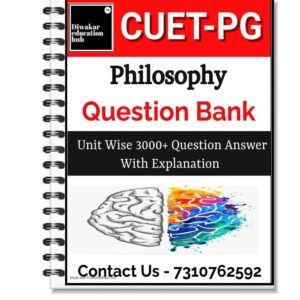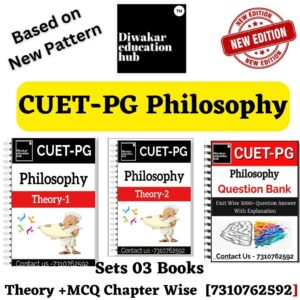CUET-PG Philosophy Study Material -Notes-Books

CUET-PG Philosophy Study Material | Notes | Books
The CUET-PG (Common University Entrance Test – Postgraduate) for Philosophy is a highly competitive exam that tests a candidate’s grasp of classical and modern philosophical thought, logic, Indian and Western traditions, ethics, metaphysics, and epistemology. To ace the exam, students must have a strong theoretical foundation, conceptual clarity, and practice solving objective questions. The CUET-PG Philosophy exam is conducted by the National Testing Agency (NTA) for admission into postgraduate philosophy programs across central universities and participating institutions in India. It is a knowledge-based exam that assesses deep analytical understanding, critical reasoning, and philosophical interpretation.
Format of CUET-PG Philosophy Exam
| Component | Details |
|---|---|
| Exam Mode | Computer-Based Test (CBT) |
| Number of Questions | 75 MCQs |
| Duration | 105 minutes |
| Total Marks | 300 marks |
| Question Type | Multiple Choice Questions (MCQs) |
| Negative Marking | Yes (-1 for each incorrect answer) |
| Medium of Paper | English only |
Recommended Study Material / Notes
-
CUET-PG Philosophy [HUQP16] Question Bank Book 3000+ Question Answer Chapter Wise As Per Updated Syllabus
Original price was: ₹800.00.₹750.00Current price is: ₹750.00. -
CUET-PG Philosophy [HUQP16] Set of 3 Books [Theory+ 3000 MCQ] As Per Updated Syllabus 2025
Original price was: ₹1,500.00.₹1,400.00Current price is: ₹1,400.00.
Selecting the best study material for CUET-PG Philosophy requires a thoughtful approach, as the subject is both vast and abstract. The first and most important step is to go through the official CUET-PG syllabus in detail. Understanding what topics are actually tested—such as Indian and Western Philosophy, Ethics, Logic, Epistemology, Metaphysics, and Contemporary Thought—will help in narrowing down relevant resources and avoiding unnecessary ones.
For Indian Philosophy, books like “A Critical Survey of Indian Philosophy” by Chandradhar Sharma or “Introduction to Indian Philosophy” by Dutta & Chatterjee provide deep yet accessible insights. These are widely used by both undergraduate and postgraduate students and are known for their conceptual clarity. For Western Philosophy, “A Critical History of Western Philosophy by Y. Masih or Frank Thilly’s classic “History of Philosophy” can be relied on, as they give a chronological and thematic understanding of major thinkers and their contributions.
Logic is a scoring section in CUET-PG, and to master it, textbooks like “Introduction to Logic” by Irving Copi or other symbolic logic primers are immensely useful. Ethics can be covered with books such as “Ethics by William Frankena or “Ethics: Theory and Contemporary Issues” by Barbara MacKinnon, which cover both classical theories and modern moral problems.
CUET-PG Philosophy 4-Month Weekly Timetable
| Week | Main Topics | Focus Area | Key Tasks |
|---|---|---|---|
| Week 1 | Vedas, Upanishads, Samkhya, Yoga | Indian Philosophy – Foundations | Read IGNOU/standard texts, make summary notes |
| Week 2 | Nyaya, Vaisheshika, Vedanta | Indian Philosophy – Systems | Diagrams of key doctrines, 25–30 MCQs daily |
| Week 3 | Socrates, Plato, Aristotle | Western Philosophy – Classical Thinkers | Timeline notes, comparison charts, MCQs |
| Week 4 | Rationalism, Empiricism, Kant | Western Philosophy – Modern Thought | Concept mapping, solve topic-wise MCQs |
| Week 5 | Utilitarianism, Deontology, Virtue Ethics | Ethics – Theories & Thinkers | Case-based questions, flowcharts, 30 MCQs/day |
| Week 6 | Logic – Propositions, Truth Tables, Syllogism | Logic – Symbolic & Deductive Logic | Practice logic sets, truth value tables |
| Week 7 | Epistemology – Knowledge, Belief, Truth | Epistemology – Classical & Modern Views | Concept notes, MCQs from UGC-NET sets |
| Week 8 | Metaphysics – Substance, Time, Reality | Metaphysics – Core Issues | Mind maps, comparison of Indian/Western views |
| Week 9 | Full Revision: Indian Philosophy | Consolidation – Concepts & Theories | Daily revisions + Topic-wise mock test |
| Week 10 | Full Revision: Western Philosophy | Consolidation – Concepts & Theories | Timed tests + error notebook |
| Week 11 | Revision: Ethics + Logic | Consolidation – Applied Philosophy | Rapid review charts + 40 MCQs/day |
| Week 12 | Revision: Epistemology + Metaphysics | Advanced Revision | Write 1-page reviews per topic |
| Week 13 | Mixed Topic Tests + Flashcard Review | Final Practice Phase | 2 Full mock tests + error analysis |
| Week 14 | Mock Tests + Revision of Weak Areas | Test Practice + Strengthening | Practice under timed conditions |
| Week 15 | Thinkers, Terminologies, Contemporary Views | High-Yield Focus Areas | Recall tables, rapid-fire Q&A, revise flashcards |
| Week 16 | Final Polishing & Strategy Refinement | Confidence Building | 2 Full mock papers, formula sheets, mental preparation |




